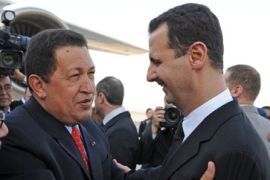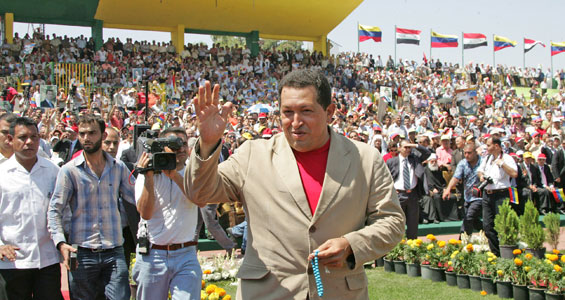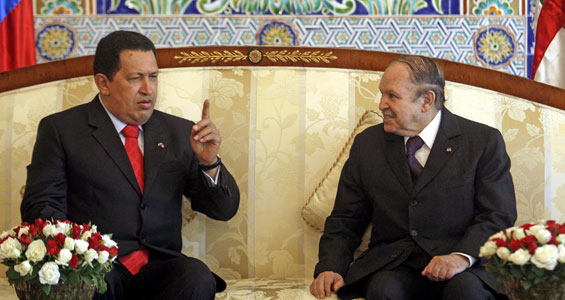Chavez visits Arab capitals
Al Jazeera’s Dima Khatib reports on the Venezuelan president’s Middle East tour.

 |
| Hugo Chavez was given a hero’s welcome in Swaidah province in southern Syria [EPA] |
Al Jazeera’s correspondent in Latin America, Dima Khatib, is the only foreign correspondent travelling with Hugo Chavez, the Venezuelan president, as he embarks on a diplomatic visit to a number of Arab countries.
She is keeping a daily reporter’s diary as part of our special coverage of his tour of the region.
|
Friday, September 4, 2009: Chavez receives hero’s welcome in Syria |
I must have landed in Damascus International Airport dozens of times throughout my life, but arriving with Hugo Chavez on board his Cuban aircraft was an entirely different experience.
For starters, we were warmly greeted by Bashar al-Assad, the Syrian president, and senior figures in his cabinet.
Very quickly we headed toward the presidential palace. Forget about my usual hassles with immigration and luggage in Damascus Airport. I have come this time as part of a presidential entourage.
“Let’s make a new organisation which would group all the countries of the axis of evil!” Chavez joked with al-Assad.
While the two were still holding their talks in the People’s Palace in Damascus, journalists and staff were anxious to have a glass of water or a cup of coffee as it was already time to break the fast.
They finally emerged and held a joint press conference; it was Chavez’s first press conference of the tour, and one of few ever done jointly with an Arab president.
“Nothing is a coincidence,” says Chavez, answering my question about why he chose to visit Libya, Algeria and Syria out of all Arab countries.
“The map led us to these countries; it is the road of the camels that tread hard.”
This was met with laughter and admiration from Syrian ministers and journalists alike. They would often interrupt his speech with applause, especially when he repeated his hard-line positions against Israel, which he accuses openly of genocide.
Such statements from a country so far away, which even severed all ties with Tel Aviv, seem almost surreal given that many Arab countries still maintain diplomatic relations with Israel.
‘Gorgeous Syrian ladies’
Al-Assad then took Chavez to a famous local restaurant called Al Bait Al Shami (Damascene House), just across the street from the Ommayyad Mosque in old Damascus.
The restaurant was full of patrons when both Chavez and Assad just walked in. Food never stopped coming; everybody loved the typical Syrian appetisers and the freshly-baked bread.
This kind of public appearance was unusual in Damascus when I had lived under Hafez al-Assad, the former president, years ago.
So I was truly surprised to see that happening in today’s Syria. It was also the first time in all of my travels with Chavez that I have seen him eat in a restaurant open to the public.
Many Syrians walked over to the two presidents to greet and take pictures with them. Later on Chavez told me he thought the Syrian ladies who talked to him were “gorgeous, especially on a night like this, with a full moon”.
The following day, Chavez himself drove a black Mercedes to Swaidah, 80km south of Damascus, followed by a long caravan of cars transporting his delegation and Syrian hosts.
At one point in a town called Lahisa, dozens of admirers surrounded the car noisily and then lifted it off the ground for a few seconds with Chavez and his ministers inside, as a sign of gratitude for “being who he is and doing what he does”.
Chavez’s staff were all interested in seeing the black stone that gave Suwaidah its name, since it is the town from which many members of the Syrian community in Venezuela emigrated.
Nervous translator
In Suwaidah’s Municipal Stadium thousands rushed at Chavez and thronged the gate. I was just behind him, and the pushing and shoving was really rough.
People were madly pushing toward us so they could get close to Chavez to say hello, take a picture, or to just shake his hand.
I had been through such experiences with Chavez before in Venezuela and elsewhere, but it was the first time to see such a reception in an Arab country.
“Marhaba” said Chavez greeting the cheering crowd, using a new word in Arabic that he had just learnt.
He usually greets all Arabs with a “assalam alaikoum” but he wanted to address Syrians in their local mannerisms.
When he condemned the Israeli government and demanded the return of the Golan Heights to Syria, the crowd’s excitement could hardly be contained.
However, when he tried to make the difference between the people and government of Israel – something he often does to show respect to the Jewish people as such – the Arabic translator got nervous. So when Chavez said: “I greet the Israeli people”, the translator said with a shaky voice: “I greet the Israeli people … who want peace”.
Syrians have always referred to Israel as the ‘Zionist entity’, so it wasn’t surprising to see the translator sweat a little.
Chavez’s speech lasted only two hours, probably because everyone had been standing in the sun, including him. With no drinks around because of Ramadan, everyone was suffering. But that did not stop the crowds from shouting “Chavez Chavez Chavez”, and then the pushing and shoving was even worse as they desperately wanted to touch him while we were leaving the place.
Many in Syria believe Chavez symbolises resistance against evil.
One old man stopped Chavez and told him he had carried him as a baby in his home town of Sabaneta in Barinas State in Venezuela. Chavez said he did remember that this man was a friend of his father’s – one of many Arabs he recalls from his childhood.
Chavez later inaugurated a Syrian-Venezuelan cultural centre in town before heading back to Damascus where he was due to board a flight for Tehran.
I tried to nap just before landing in another potential member state in Chavez’s and Assad’s imaginary Organisation of the Countries of the Axis of Evil.
|
Thursday, September 3, 2009: Leaving Algeria |
 |
| Chavez, left, says Bouteflika, right, expressed great interest in Latin America [EPA] |
“Hello guys, did you get some rest?” asks Hugo Chavez as he walks down the aisle of the presidential plane while we waited to take off from Algeria’s Houari Boumedienne International Airport for Damascus.
“We are very tired, President, we don’t understand how you can do it,” says one accompanying Venezuelan journalist.
“But I am the oldest here and I feel fine,” says Chavez with a big smile, “You should get some sleep now. We will fly for three hours or more to reach Damascus.”
The Venezuelan president is looking fresh and content as he heads to the third country on his world tour.
His first visit to the region began in Libya, where he spent two-and-half days attending an African Union Summit and commemorating Libya’s official celebrations marking 40 years since Muammar Gaddafi, the Libyan president, became leader of the country.
On Wednesday, we were in Algeria and are soon leaving for Damascus to meet with Bashar al-Assad, the Syrian president.
Chavez stops to say hello and chat with almost every one on the plane, including the Cuban crew on this Russian-made jumbo Cubana air plane, lent to him by Cuba because his presidential plane is undergoing maintenance.
In a spontaneous press briefing to Al Jazeera, TeleSUR, the Venezuelan media network, and members of his own presidential press, he talks enthusiastically about Abdelaziz Bouteflika, the Algerian president .
Bouteflika had asked him about every single Latin American country, showing great interest in Chavez’s part of the world.
In another stop on the plane with accompanying officials from his own government, he wonders why there is not much commercial exchange between Venezuela and “old friends” like Algeria and Libya, with whose leaders he has, as he puts it, a “solid personal relationship”.
One of his staff says: “Maybe we are not paying enough attention to these countries.”
Algerian soup
Chavez talks about a new highway that Algeria is building between the east and the west of the country. He wonders why Venezuela does not provide Algeria with the asphalt it needs to complete the highway.
Chavez does not hide the great joy he feels to be in the Arab World, where he is very popular thanks to his anti-Israel positions which culminated in the severing of all ties with Israel during its war on Gaza earlier this year.
He enjoyed having an iftar (breaking of the Ramadan fast) banquet on Wednesday hosted by Bouteflika in the official Zeralda Residence, a complex located outside the capital Algiers, used to receive official delegations visiting the country.
It was his first iftar meal since starting the tour and it lasted for four hours.
There was Algerian soup, fish from the Mediterranean, lamb and lots of sweets. Chavez also had mint tea and lemon-mint ice cream.
He was clearly enjoying himself, often laughing in Bouteflika’s company, who spoke to Chavez with the help of French-Spanish interpreters on both sides; Bouteflika spoke French at all times, and not Arabic, something Chavez’s aides found confusing.
Beyond the rhetoric
Chavez’s mission in Algeria was accomplished as Bouteflika pledged to attend the Second African Union – Unasur (Union of South American Nations) Summit to be held at the end of the month on Margarita Island in Venezuela.
During their long conversation over iftar, they discussed ways to make the summit useful for both regions and not just “talk” between leaders, so it would have a real impact in areas like trade, education, finance, health and others.
On his way up the other aisle of the presidential plane returning to the front, I told him that I had been banned from covering the visit in Algeria, because “Al Jazeera is not accredited in the country”.
Chavez was surprised to hear of this and wondered whether he had done well by introducing me to Bouteflika when we had arrived.
Our conversation ended there as one of his aides said anxiously: “President Bouteflika is waiting for you downstairs, Mr President”.
It was midday Algerian local time as Chavez hurried down the plane where Bouteflika was standing in the sun in Houari Boumedienne International Airport.
They quickly said goodbye in an official ceremony and within minutes he was back on the plane and we were on our way to Damascus.